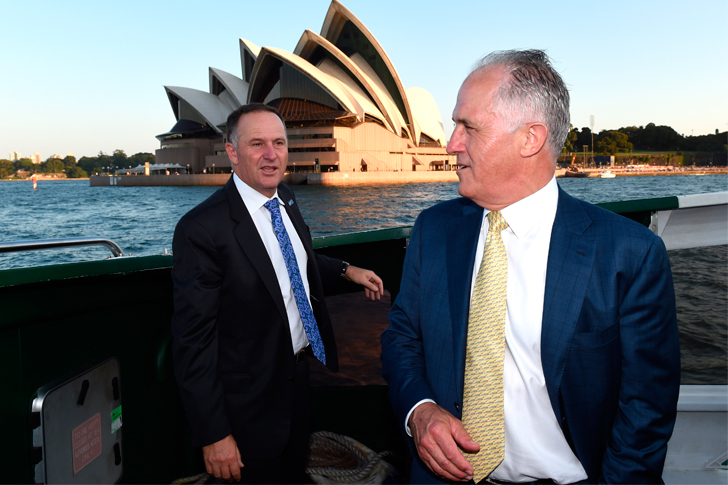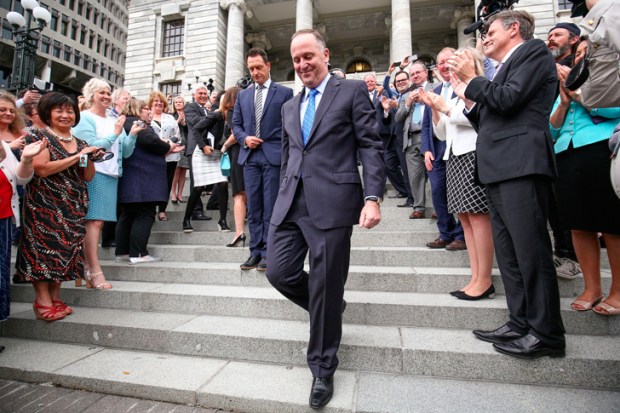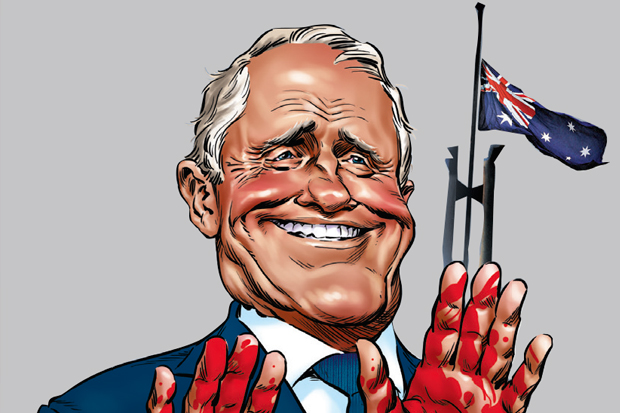Once upon a time, a multi-millionaire, former merchant banker Prime Minister, highly successful in business who came to politics later in his career, became leader of a party then lagging in the polls.
Malcolm Turnbull? No, New Zealand’s outgoing PM, John Key.
Last month, Key surprised everyone by resigning as Kiwi PM. He anointed his own preferred successor, veteran Finance minister Bill English, who duly took the crown with a new deputy and heir presumptive to the National party leadership, welfare reformist Paula Bennett.
Since 2008 Key and English won three elections on the trot, and English is well-placed for a fourth, all despite being in permanent minority in the New Zealand parliament, with its electoral system rolling Australia’s constituency-based House of Representatives and PR-elected Senate into one. Even so, they’ve successfully introduced and implemented fiscal, economic, welfare and social reforms inspiring imitators in Britain, Europe, even Australia.
Unlike Kevin Rudd, Julia Gillard, Tony Abbott and Turnbull, Key brought voters along with him. Kiwis warmed to Key’s public housing to fame and fortune success story, and his genuine down-to-earth character. On election night 2014, Key headed down his Auckland driveway to share a kerbside beer with jubilant neighbours and supporters: contrast that to Turnbull’s petulant election night last July.
Key inspired and endeared himself to New Zealanders through his daggy likeability. Yet, with English at his side, Key was a confident prime minister, parlaying his deep understanding of banking and financial markets into a response to the Global Financial Crisis that helped New Zealand’s brittle economy not only weather the storm, but thrive.
Behind the scenes, Key was ably assisted by a chief-of-staff who also came from business, Wayne Eagleson, who understands the importance of building positive and less adversarial relationships with the Opposition, minor parties and giant egos like New Zealand First’s Winston Peters. An avoider of limelight, Eagleson is less a command and control gatekeeper and more a facilitator and supporter for ministers, staff and MPs. Key’s office on the top floor of Wellington’s Beehive, with magnificent views to match, was a happy and accessible one, reflecting his and Eagleson’s ‘we don’t have all the answers’ approach: it was held in high esteem across the New Zealand political spectrum, unlike its Rudd, Abbott or Turnbull equivalents.
Had the formidable and fierce political warrior Peta Credlin been more like Eagleson, she likely would still be in her old job and Tony Abbott Australia’s prime minister. English is fortunate to have Eagleson stay on.
Moreover, Key himself was readily accessible to backbench and non-government MPs, socialising and sharing information and insights with them, the media and the Kiwi public. Can you imagine Turnbull fronting a press conference after every Cabinet meeting to explain decisions in detail as well as discuss whatever was on his mind? That’s what Key did.On the day he announced his resignation the first inkling something was up was Key’s cancelling his weekly appearance. Key appreciated that while knowledge is power, shared knowledge smooths the way to making even the toughest reforms politically possible – and minimises political problems when they arise.
Key was not only a successful economic manager and politician. He was also a national leader able to inspire and empathise with New Zealanders, while equally at ease playing golf with President Obama and taking tea with the Queen. When 43 men died in 2010’s Pike River mining disaster Key was there, not only comforting the victims but grieving with them. When a royal commission found regulatory and inspection failures contributed to the accident, Key didn’t obfuscate: he ensured the government accepted full responsibility for its failings, irrespective of whose watch these occurred on, and apologised unequivocally to victims and their families.
And when the Christchurch region was devastated by earthquakes in 2011 and subsequently, including November’s Kaikoura quake, Key was a hands-on leader. He ensured everything possible was done to coordinate massive rescue and rebuilding efforts. He was on the scene as much as possible, continually reassuring, listening and explaining to shocked, distraught and grieving residents. He, English and Eagleson made sure politics and red tape didn’t obstruct reconstruction.
Above all, thanks to his and English’s prudent economic management and reform, Key could commit the billions needed to finance the Christchurch rebuilding effort without damaging the wider Kiwi economy, and when international financial aid was offered could say, ‘thanks, but we’ve got this’.
Despite having been in permanent minority government, Key proved that a centre-right leader with a strong and defined policy agenda can be a highly successful PM.
He showed that, with sound political strategy and a clear sense of direction, leaders can bring the people with them, even when reforms are unpopular. And he showed how good personal and political relations can make difficult but beneficial policy changes possible despite a notionally-hostile parliament.
This side of the ditch, Australians can only wish New Zealand’s now former millionaire merchant banker PM was our own millionaire merchant banker PM. Turnbull should look to Key to see how to be a political success in running a coherent government and making our ragbag Senate work. While Turnbull’s efforts to sound sincere and man-of-the-people look staged, contrived and overacted, Key was sincere, engaging and accepted by Kiwis of all walks of life as a ‘bro’. That common touch, combined with English’s unflamboyant economic substance, enabled National to sell difficult reforms and make necessary fiscal sacrifices to get New Zealand’s budget back in the black ahead of schedule. What’s more, Key, English and Eagleson’s focus on relationship-building shows Turnbull how to approach Australia’s populist and ego-strewn Senate mess.
While he wasn’t perfect, and didn’t win every political battle, John Key’s overall success outshone Australian PMs from Rudd to Turnbull. Key has said he’s now open to working in Australia: Turnbull should contract him, pronto, as his policy and political mentor.
His miserable 2016 and worse start to 2017 shows how badly he needs one.
Got something to add? Join the discussion and comment below.
Get 10 issues for just $10
Subscribe to The Spectator Australia today for the next 10 magazine issues, plus full online access, for just $10.
You might disagree with half of it, but you’ll enjoy reading all of it. Try your first month for free, then just $2 a week for the remainder of your first year.














Comments
Don't miss out
Join the conversation with other Spectator Australia readers. Subscribe to leave a comment.
SUBSCRIBEAlready a subscriber? Log in